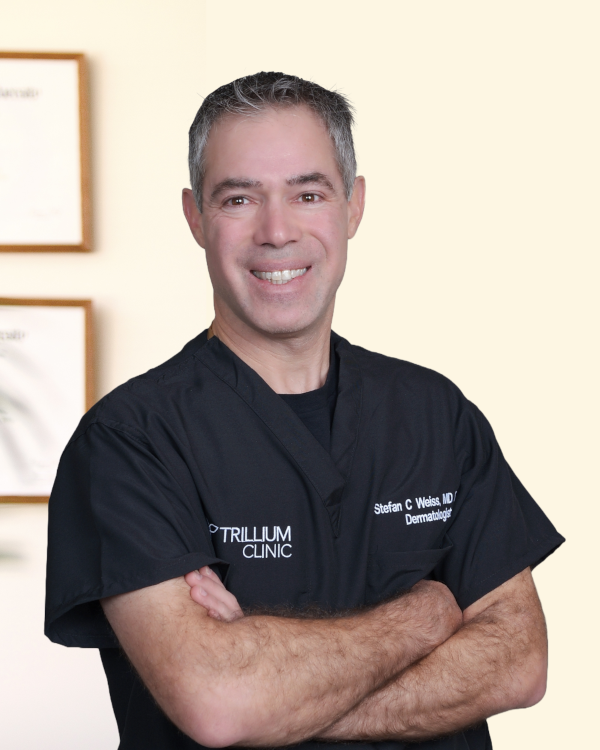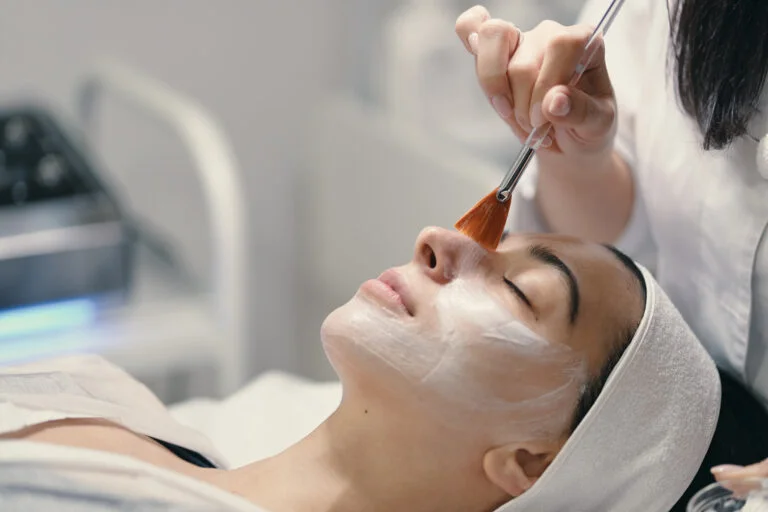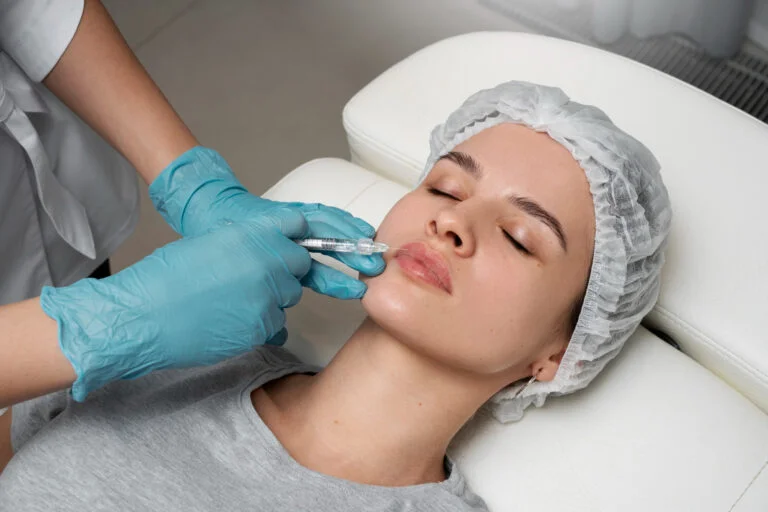Common Skin Concerns in Chapel Hill, NC
Introduction
Chapel Hill, North Carolina, known for its blend of Southern charm, academic excellence, and active community, presents unique skin challenges for its residents. The area’s climate, lifestyle, and environmental factors significantly influence skin health, leading to common dermatological concerns. This blog explores these issues, highlighting their causes, treatments, and preventative measures from the perspective of a trusted dermatologist. Residents can use this guide to better understand their skin and how to care for it in Chapel Hill’s specific environment.
Table of Contents
Overview of Chapel Hill’s Climate and Lifestyle
Chapel Hill experiences a humid subtropical climate characterized by hot summers, mild winters, and abundant rainfall throughout the year. Average summer temperatures often exceed 85°F, while winter temperatures rarely drop below freezing. Seasonal changes bring varying levels of humidity, pollen, and UV radiation, all of which influence skin health. Residents enjoy an active outdoor lifestyle, frequently engaging in activities such as hiking at Occoneechee Mountain or attending outdoor events at the University of North Carolina. However, these activities increase exposure to environmental stressors like UV rays, allergens, and pollutants.

The Impact of Environmental and Lifestyle Factors on Skin Health
Chapel Hill’s environment poses unique challenges for maintaining healthy skin. Key factors include:
- UV Radiation: Prolonged sun exposure increases the risk of skin cancer, premature aging, and hyperpigmentation. The region’s sunny climate exacerbates these concerns.
- Humidity: High humidity in summer often leads to clogged pores, fungal infections, and acne flare-ups, while drier winters can cause skin dehydration and eczema.
- Allergens: Seasonal pollen surges and environmental allergens trigger conditions like eczema and contact dermatitis.
- Pollution: Urban development and nearby industrial activities contribute to skin damage and premature aging
Understanding Common Skin Concerns in Chapel Hill, NC

Chapel Hill experiences a humid subtropical climate characterized by hot summers, mild winters, and abundant rainfall throughout the year. Average summer temperatures often exceed 85°F, while winter temperatures rarely drop below freezing. Seasonal changes bring varying levels of humidity, pollen, and UV radiation, all of which influence skin health. Residents enjoy an active outdoor lifestyle, frequently engaging in activities such as hiking at Occoneechee Mountain or attending outdoor events at the University of North Carolina. However, these activities increase exposure to environmental stressors like UV rays, allergens, and pollutants.
1. Psoriasis
What Is Psoriasis and Its Impact on Skin?
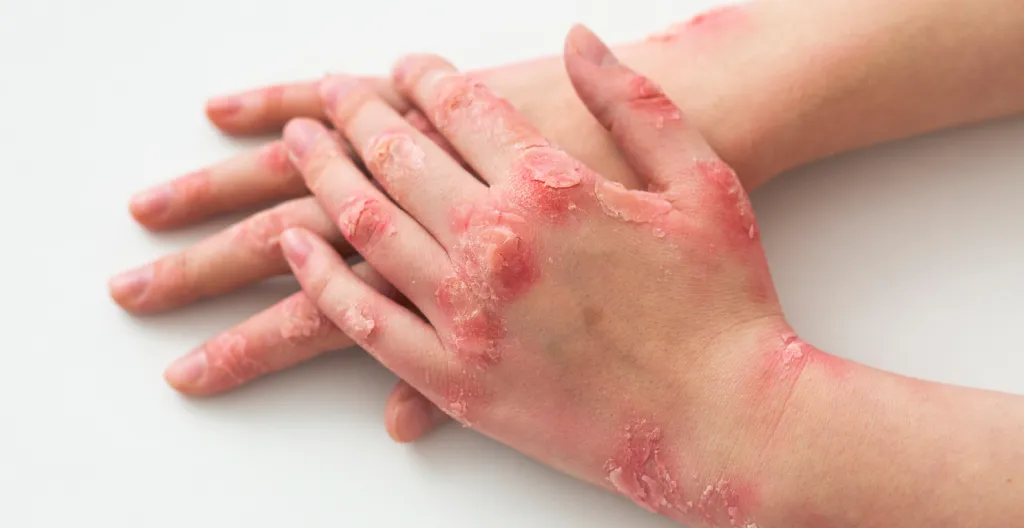
Psoriasis is a chronic autoimmune condition characterized by rapid skin cell turnover, resulting in scaly, thickened plaques on the skin. It often affects the scalp, elbows, knees, and lower back, causing discomfort, itching, and in some cases, pain. Beyond physical symptoms, psoriasis can negatively impact mental health and quality of life. In Chapel Hill, the prevalence mirrors national averages, affecting approximately 2% of the population.
Triggers and Prevalence in Chapel Hill
Common triggers for psoriasis include:
- Stress: Academic and professional pressures unique to Chapel Hill’s university-centered community often exacerbate flare-ups.
- Weather Changes: Cold, dry winters and humid summers influence symptom severity, with winter conditions often worsening dryness and scaling.
- Genetics: A family history of psoriasis increases risk. Approximately 40% of patients report a genetic predisposition.
Treatment Options for Psoriasis
Management of psoriasis typically involves a combination of therapies:
- Topical Treatments: Corticosteroids and vitamin D analogs are effective first-line treatments for mild to moderate cases.
- Phototherapy: Controlled exposure to ultraviolet light can reduce inflammation and slow skin cell growth.
- Biologics: Advanced treatments like Tremfya (guselkumab) target specific immune pathways, providing long-lasting symptom relief with minimal side effects.
2. Eczema
Eczema in Adults and Children
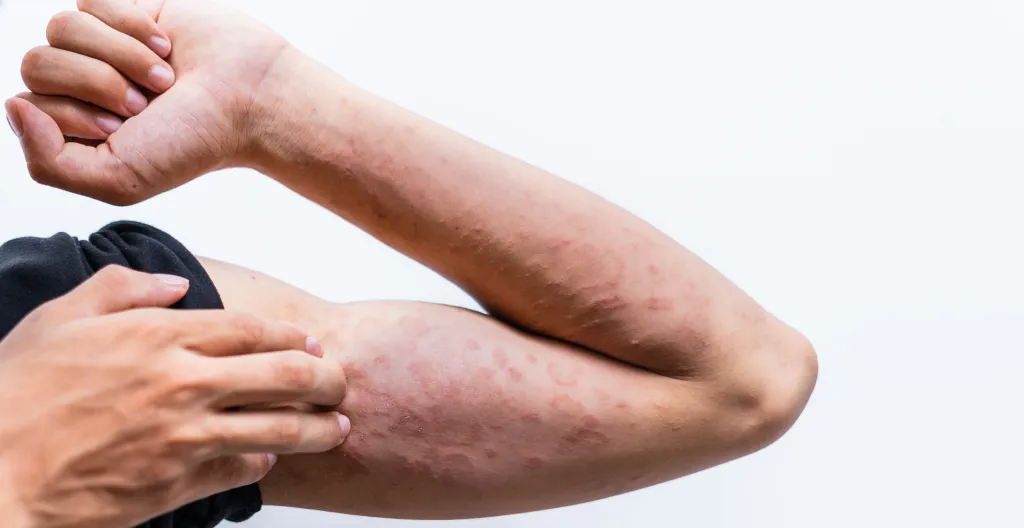
Eczema, or atopic dermatitis, is a chronic inflammatory condition characterized by red, itchy, and inflamed skin. It commonly affects both children and adults, with prevalence rates higher in areas with fluctuating climates, such as Chapel Hill. The condition manifests in various forms, including atopic dermatitis, contact dermatitis, and seborrheic dermatitis.
Environmental Factors in Chapel Hill
Chapel Hill’s climate and vegetation contribute significantly to eczema flare-ups:
- Humidity: High moisture levels can trigger fungal infections and worsen seborrheic dermatitis.
- Allergens: Seasonal pollen and dust mites frequently exacerbate atopic dermatitis.
Managing Eczema Effectively
Treatment focuses on reducing inflammation and preventing flare-ups:
- Moisturization: Daily use of emollients is critical for maintaining the skin barrier.
- Avoiding Irritants: Fragrance-free and hypoallergenic skincare products are recommended.
- Prescription Options: Topical steroids, topical Jak inhibitors and topical PDE4 inhibitor, Upadacitinib and newer biologics like dupilumab, nemolizumab, and tralokinumab are effective in managing severe cases.
3. Hair Loss Concerns
Types of Hair Loss (Alopecia)
Hair loss affects individuals of all ages and genders. Common types include:
- Androgenetic Alopecia: Genetic hair thinning often seen in men and women.
- Alopecia Areata: An autoimmune condition causing patchy hair loss.
- Telogen Effluvium: Temporary hair shedding triggered by stress, illness, or hormonal changes.
Causes of Hair Loss in Chapel Hill Residents
Factors contributing to hair loss include:
- Stress: The demands of academic and professional life are significant stressors.
- Nutrition: Diets lacking essential nutrients like iron and biotin can lead to hair thinning.
- Medical Conditions: Thyroid disorders and autoimmune diseases are common underlying causes.
Available Treatments for Hair Loss
Treatment options aim to restore hair growth and confidence:
- PRP Therapy: Platelet-rich plasma injections stimulate hair follicles and promote regrowth.
- Medications: FDA-approved treatments like minoxidil and finasteride are widely used.
- Lifestyle Adjustments: Nutritional counseling and stress management can support hair health.
4. Skin Cancer Awareness
Skin Cancer in Chapel Hill’s Population
Skin cancer is the most common form of cancer in the United States. In Chapel Hill, prolonged outdoor activities increase exposure to UV radiation, a major risk factor. Common types include:
- Basal Cell Carcinoma: Often caused by cumulative sun exposure.
- Squamous Cell Carcinoma: Can develop in sun-exposed areas or from precancerous lesions.
- Melanoma: The deadliest form, often linked to intense, intermittent sun exposure or tanning.
Importance of Regular Skin Checks
Early detection significantly improves outcomes. Dermatologists recommend:
- Monthly Self-Exams: Monitoring moles and lesions for changes in size, shape, or color.
- Annual Dermatologist Visits: Professional evaluations using dermoscopy and imaging tools.
Prevention and Treatment Options
Strategies for prevention and treatment include:
- Sun Protection: Daily use of SPF 30+ sunscreen, protective clothing, and seeking shade.
- Surgical Treatments: Excision or Mohs surgery for removing cancerous tissue.
- Innovative Therapies: Targeted treatments like immunotherapy for advanced cases.
5. Acne: A Universal Concern
Acne is one of the most common skin concerns, affecting individuals of all ages and backgrounds. While often associated with adolescence, acne can persist into adulthood and is influenced by various factors, including genetics, hormonal changes, and lifestyle. In Chapel Hill, the prevalence of acne can also be tied to the local climate, stress levels, and dietary habits.
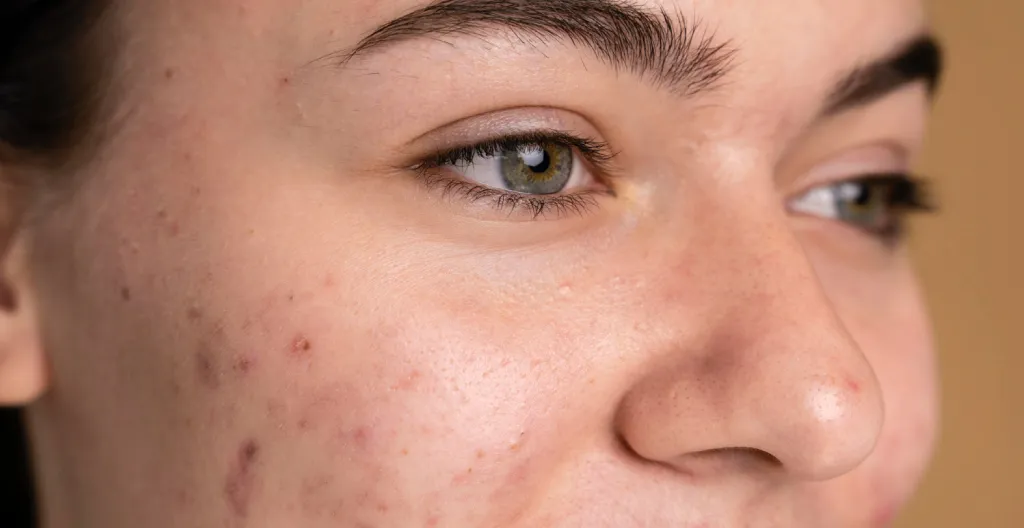
Causes of Acne Across Different Ages
Acne is a multifactorial condition. During adolescence, hormonal fluctuations lead to increased sebum production, clogging pores and contributing to the development of whiteheads, blackheads, and pustules. In adults, acne is often linked to stress, which increases cortisol levels and inflammation. Diets high in refined sugars and dairy products can exacerbate acne, particularly in adults.
Effective Acne Treatments
Advances in dermatology have made acne management more effective than ever. Treatments are tailored to the severity and type of acne, including:
- Topical Treatments: Benzoyl peroxide, salicylic acid, and retinoids are first-line therapies that target clogged pores and reduce inflammation.
- Oral Medications: Antibiotics and hormonal treatments, such as oral contraceptives or spironolactone, are used for moderate to severe acne.
- In-Office Procedures: Chemical peels and light therapy provide additional therapeutic options for resistant or cystic acne.
Preventing Acne Flareups in Chapel Hill
Chapel Hill’s humid summers can contribute to clogged pores, while dry winters may lead to increased skin sensitivity. A proper skincare routine is essential to manage these seasonal shifts. Dermatologist-recommended products, including non-comedogenic moisturizers and cleansers, can help prevent flare-ups. Adopting an anti-inflammatory diet, managing stress, and avoiding heavy makeup further support clear skin.
6. Hyperpigmentation
Hyperpigmentation is characterized by darkened patches of skin resulting from an overproduction of melanin. While common across all skin types, individuals with skin of color are particularly prone due to their increased melanin levels.
What Causes Hyperpigmentation?
Hyperpigmentation arises from various triggers, including:
- Sun Damage: Chronic UV exposure without adequate protection leads to the formation of sunspots.
- Postinflammatory Hyperpigmentation (PIH): Acne, eczema, and skin injuries often result in PIH, especially in darker skin tones.
- Hormonal Changes: Conditions like melasma are more prevalent in women, often exacerbated by pregnancy or oral contraceptives.
How to Treat Hyperpigmentation
Treatment strategies for hyperpigmentation involve reducing melanin production and promoting skin renewal:
- Topical Treatments: Hydroquinone, kojic acid, and vitamin C effectively lighten dark spots.
- Chemical Peels: Superficial peels using alpha-hydroxy acids (AHAs) promote exfoliation and improve skin tone.
- Laser Therapy: Nonablative lasers are safe and effective for addressing hyperpigmentation in skin of color.
Consistent use of broad-spectrum sunscreen is critical in preventing further pigmentation issues and ensuring the efficacy of treatments.
7. Skin Rashes
Skin rashes encompass a broad spectrum of conditions, from mild irritations to chronic diseases. In Chapel Hill, allergens, humidity, and seasonal changes are major contributors to rashes.
Identifying Different Types of Skin Rashes
The most common rashes include:
- Allergic Reactions: Triggered by contact with substances like poison ivy or fragrances.
- Fungal Infections: Often affecting warm, moist areas such as the groin or feet.
- Viral Rashes: Associated with illnesses like shingles or measles.
Chapel Hill Specific Triggers for Rashes
Residents of Chapel Hill may encounter unique triggers, including high pollen levels during spring and summer, contributing to atopic dermatitis. Excessive sweating during humid months can lead to fungal infections like tinea versicolor.
Treatment and Prevention Strategies
Managing skin rashes begins with identifying and avoiding triggers. Dermatologists may recommend:
- Remedies: Antihistamines and soothing lotions for allergic rashes.
- Prescription Treatments: Topical steroids, antifungals, or antivirals tailored to the underlying cause.
- Preventive Measures: Regular cleansing, wearing breathable fabrics, and moisturizing help minimize rash development.
8. Cosmetic Skin Concerns
As the demand for aesthetic procedures grows, residents of Chapel Hill seek effective treatments for fine lines, wrinkles, and sun damage. Modern dermatology offers a range of solutions to rejuvenate the skin and enhance natural beauty.
Addressing Fine Lines, Wrinkles, and Sun Damage
Signs of aging, such as crow’s feet and marionette lines, are common concerns. Chronic sun exposure accelerates the aging process, leading to discoloration and reduced skin elasticity.
Anti-Aging Treatments
Chapel Hill residents can benefit from cutting-edge anti-aging treatments, including:
- Botox and Dermal Fillers: These minimally invasive options smooth wrinkles and restore volume.
- Laser Resurfacing: Fractional lasers improve texture and tone by stimulating collagen production.
- Skincare Products: Retinol and peptides offer non-invasive solutions for younger-looking skin.
9. Seasonal Skin Care Tips for Chapel Hill Residents
Chapel Hill’s climate presents unique challenges, from hot, humid summers to cold, dry winters. Adapting your skincare routine to these changes is essential for maintaining healthy skin year-round.
Summer Skin Care
Humidity and increased sun exposure necessitate lightweight, oil-free products and vigilant sun protection. Sunscreen with SPF 30 or higher should be reapplied every two hours during outdoor activities.
Winter Skin Care
Cold weather and indoor heating strip the skin of moisture, requiring richer creams and hydrating serums. Adding a humidifier to your home environment can further combat dryness.
Importance of SPF for Year-Round Protection
UV rays are present even on cloudy days, making sunscreen a non-negotiable component of any skincare routine. Dermatologists recommend mineral-based sunscreens for sensitive skin types.
Conclusion
Residents of Chapel Hill face a variety of skin concerns influenced by environmental and lifestyle factors. Whether addressing chronic conditions like eczema or enhancing aesthetic appeal, dermatological care plays a vital role in promoting skin health. Regular visits to a dermatologist ensure early detection and personalized treatment for optimal results.
To embark on your journey to healthier skin, schedule a consultation with our Chapel Hill clinic today.
References
- American Academy of Dermatology. “Acne Management and Treatment Guidelines.” Available at: AAD Acne Guidelines.
- Journal of the American Academy of Dermatology. “Hyperpigmentation in Skin of Color.” J Am Acad Dermatol, 2021.
- National Eczema Association. “Understanding Eczema: Causes and Treatments.” Available at: Eczema Resource.
- Mayo Clinic. “Hair Loss: Causes and Treatments.” Available at: Mayo Clinic Hair Loss.
- Skin Cancer Foundation. “Skin Cancer Prevention and Detection.” Available at: Skin Cancer Foundation.
- Chapel Hill Environmental Reports. “Pollen and Humidity Statistics.” Available at: Chapel Hill Data.

